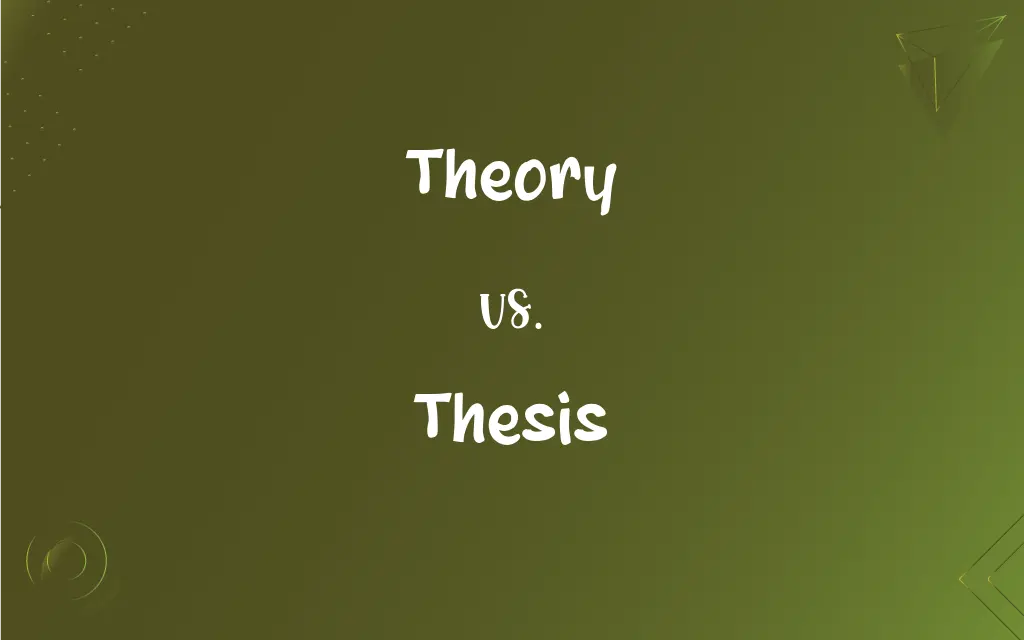Theory vs. Thesis: What's the Difference?
Edited by Aimie Carlson || By Janet White || Published on January 26, 2024
A theory is a well-substantiated explanation of aspects of the natural world, while a thesis is a statement or theory that is put forward as a premise to be maintained or proved.

Key Differences
A theory is a coherent group of tested general propositions, commonly regarded as correct, that can explain phenomena in the natural world. In contrast, a thesis is a long essay or dissertation involving personal research, written by a candidate for a college degree.
Theories are often used to predict future occurrences based on accumulated evidence and can be revised with new evidence. Theses, however, are individual arguments or propositions that a student defends or supports with research and evidence as part of their academic requirements.
Scientific theories are usually based on empirical evidence and are part of an ongoing scientific dialogue. In contrast, a thesis is typically a standalone piece of writing that represents the culmination of one's research and findings in a specific academic field.
Theories are usually widely accepted in the scientific community after rigorous testing and validation. On the other hand, a thesis is assessed and critiqued by a small panel of experts and is specific to a student's academic journey.
Theories often provide a framework for understanding a broad range of phenomena, whereas a thesis focuses on a specific question or hypothesis and aims to offer new insights or solutions in a particular area of study.
ADVERTISEMENT
Comparison Chart
Definition
An explanation of natural world
A statement for academic defense
Purpose
To explain and predict
To argue or prove a point
Basis
Empirical evidence
Personal research
Scope
General, wide application
Specific, focused topic
Acceptance
Community-wide in science
Usually within academic circles
ADVERTISEMENT
Theory and Thesis Definitions
Theory
An idea used to account for a situation or justify a course of action.
My theory is that she's avoiding me because she's upset.
Thesis
A long essay or dissertation involving personal research.
He wrote his thesis on Renaissance art history.
Theory
A supposition or a system of ideas explaining something.
His theory about space-time continuum is fascinating.
Thesis
A principle put forward as a premise to be proved.
His thesis on economic policies drew much attention.
Theory
A hypothesis assumed for the sake of argument or investigation.
In theory, the plan could work, but it's risky.
Thesis
The central argument or proposition in a scholarly work.
The thesis of her paper was controversial and thought-provoking.
Theory
A set of principles on which the practice of an activity is based.
The theory of evolution explains the diversity of life.
Thesis
A statement or theory that is put forward to be maintained or proved.
Her thesis was that the movie influenced fashion trends.
Theory
A collection of propositions to illustrate the principles of a subject.
Quantum theory challenges our understanding of the world.
Thesis
The main idea, opinion, or theory of a person, group, piece of writing, or speech.
Her thesis statement clearly outlined her stance on the issue.
Theory
A set of statements or principles devised to explain a group of facts or phenomena, especially one that has been repeatedly tested or is widely accepted and can be used to make predictions about natural phenomena.
Thesis
A proposition that is maintained by argument.
Theory
The branch of a science or art consisting of its explanatory statements, accepted principles, and methods of analysis, as opposed to practice
A fine musician who had never studied theory.
Thesis
A dissertation advancing an original point of view as a result of research, especially as a requirement for an academic degree.
FAQs
Can theories be proven?
Theories can be supported by evidence but are open to revision or rejection if new evidence contradicts them.
What is an example of a theory?
The theory of evolution by natural selection is a well-known example.
What does "theory" mean?
A theory is a well-substantiated explanation of some aspect of the natural world, often based on a body of evidence and principles.
Is a theory just a guess?
No, in scientific context, a theory is more than a guess; it's a well-supported and testable explanation.
How is a theory different from a hypothesis?
A hypothesis is a proposed explanation made on the basis of limited evidence, while a theory is more comprehensive and backed by extensive evidence.
Can a theory change?
Yes, theories can evolve or be modified as new evidence emerges.
Is "theory" a scientific term only?
While often used in science, it can also refer to speculations or ideas in non-scientific contexts.
Is a theory the same as a law?
No, a scientific law describes a phenomenon, but a theory explains why and how that phenomenon occurs.
How long is a typical thesis?
The length varies widely depending on the academic field and level of study.
What is the origin of the word "theory"?
It comes from the Greek word "theoria," meaning a viewing or contemplation.
Can a thesis be a question?
Usually, a thesis is a statement, but it might be presented as a question that the paper will answer.
Is a thesis always based on original research?
Mostly, especially at higher academic levels, but it can also be a synthesis of existing research.
How is a thesis structured?
Typically, it has an introduction, literature review, methodology, results, and conclusion.
What is a thesis defense?
It's an oral examination where the author presents and defends their thesis to a panel of experts.
How do you develop a theory?
Theories are developed through extensive observation, experimentation, and analysis.
What is a thesis statement?
A thesis statement is a sentence that summarizes the main point or claim of an essay or research paper.
Is a thesis always for academic purposes?
Primarily, but the concept can apply to any structured argument in writing.
What does "thesis" mean?
A thesis is a statement or theory put forward as a premise to be maintained or proved, often used in academic writing.
What's the difference between a thesis and a dissertation?
In many regions, a thesis is for a master's degree, and a dissertation is for a doctorate, but this can vary.
What's the origin of the word "thesis"?
It derives from the Greek "thesis," meaning a proposition or something put forth.
About Author
Written by
Janet WhiteJanet White has been an esteemed writer and blogger for Difference Wiki. Holding a Master's degree in Science and Medical Journalism from the prestigious Boston University, she has consistently demonstrated her expertise and passion for her field. When she's not immersed in her work, Janet relishes her time exercising, delving into a good book, and cherishing moments with friends and family.
Edited by
Aimie CarlsonAimie Carlson, holding a master's degree in English literature, is a fervent English language enthusiast. She lends her writing talents to Difference Wiki, a prominent website that specializes in comparisons, offering readers insightful analyses that both captivate and inform.































































